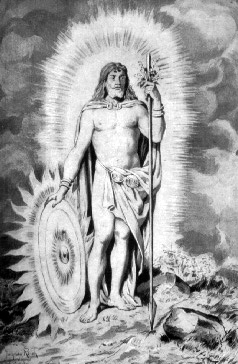Ostara Meditation
Taken from Raven Kindred South
You are walking in a dense forest. The sky is overcast, and the woods are gloomy, although occasionally, a feeble ray of sunlight makes its way through the clouds and the trees. The branches of the trees are bare, although the tips are just beginning to bud. Old leaves from last year’s fall scurry about your feet as an occasional gust of wind blows them about.
The ground is for the most part bare, with occasional patches of snow in the shade. Hints of new green life make their way up through the snow and dead leaves.
As you walk, you notice a grove of beautiful white birches, the pale glint of their trunks and branches a pleasant contrast in the otherwise dark woods. You walk towards the birch grove and then start to walk into it. When you are surrounded by the birches, you notice a large tree that looks as if it has been struck by lightning. It’s upper trunk has been split in two, the inner wood has been exposed to the air, dead leaves have blown their way into the nooks of the tree, in every way this tree looks as dead as it can be.
For some reason, you look up from the tree, and are surprised to find a woman present. She is clad all in white, and holds a covered basket. Her gaze is steady, her eyes make you think of clear streams running in the middle of old forests, her skin reminds you of the first fair flower of spring, and her hair is long and unbound. At her feet sits a small brown hare nuzzling the hem of her skirt.
She gestures, indicating that you should come forward, and you walk towards her. She points at her basket, and lifts the cloth. Inside, you see an astounding array of colored eggs, all colors, all patterns. You can think of nothing better than to pick one of these beautiful eggs, and have it for your very own.
Your hand reaches out, and she shakes her head, no. You realize that while she wants you to have an egg, she wants you to pick it sight unseen. So, you close your eyes, reach out your hand, and reach into the basket.
Eyes still closed, you draw your hand back, holding an egg. You open your eyes, and look upon your egg. What does it look like? Think to yourself what the decoration on the egg means, and why Ostara wants you to have this paticular gift for the coming spring.
After you have looked at your egg, you raise your head to thank the Goddess, and she is gone. You look about for her in vain. You wonder if it has all been a dream. the reality of the egg in your hand tells you otherwise, and you know you have received the blessing of the Goddess Ostara.
As your attention moves from yourself and to the forest, you realize that the trees now have tiny, but beautifully formed green leaves at the end of their branches. And you notice that the birch tree struck by lighting, the one that looked dead, now has green shoots rising from its split trunk. As you make your way out of the birch grove, it seems that the clouds have lightened, and even as you think this, the sun comes out. Small, barely formed flowers lightly scent the forest floor, birds are singing, and the rich smell of moist earth fills your nose.
As you make your way out of the forest, you wonder how you have found the place gloomy, it seems so alive, and pleasant to walk through.

